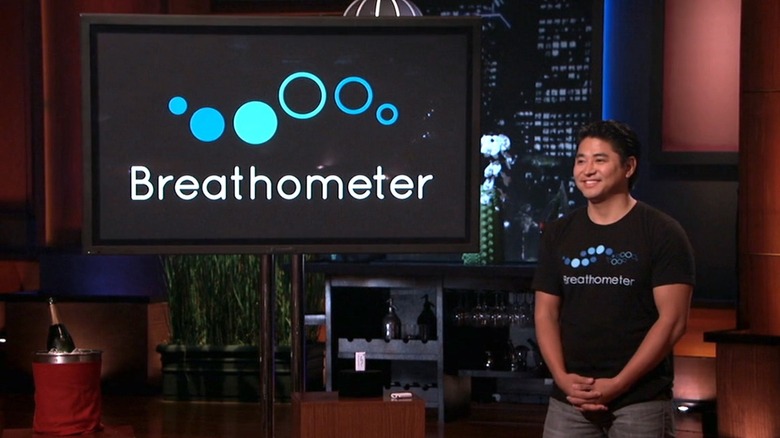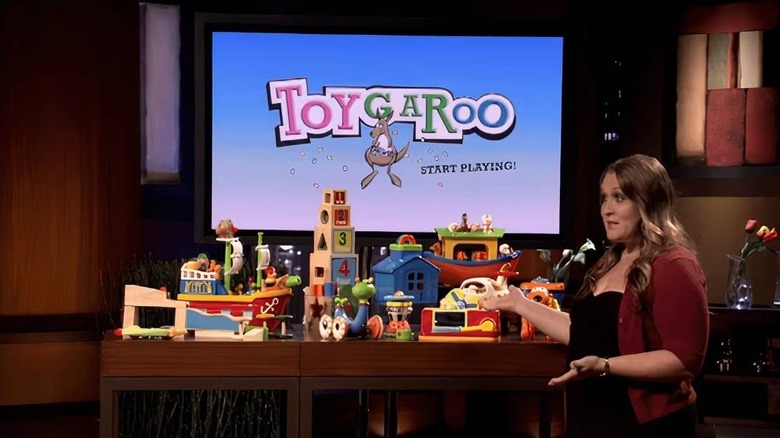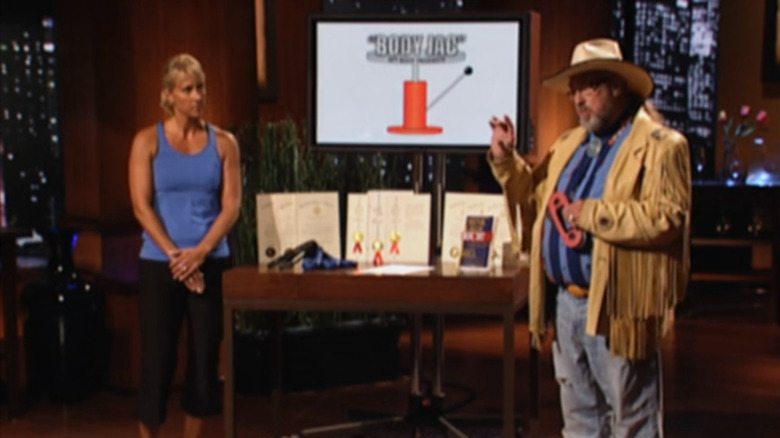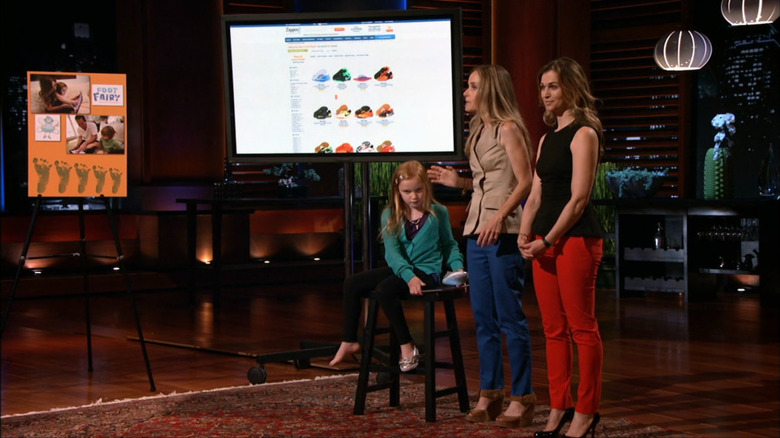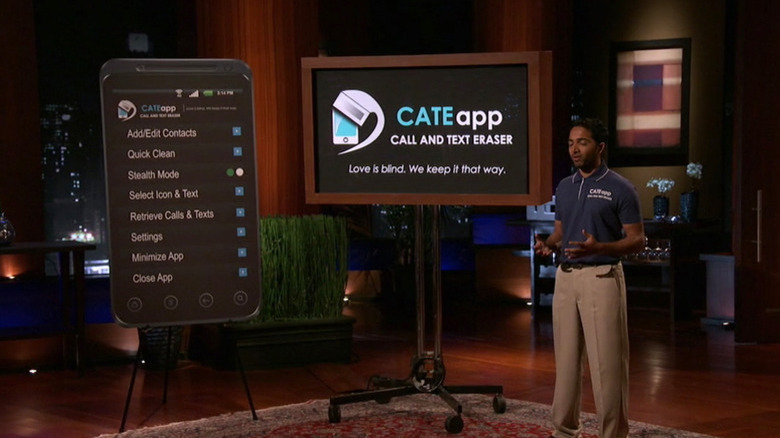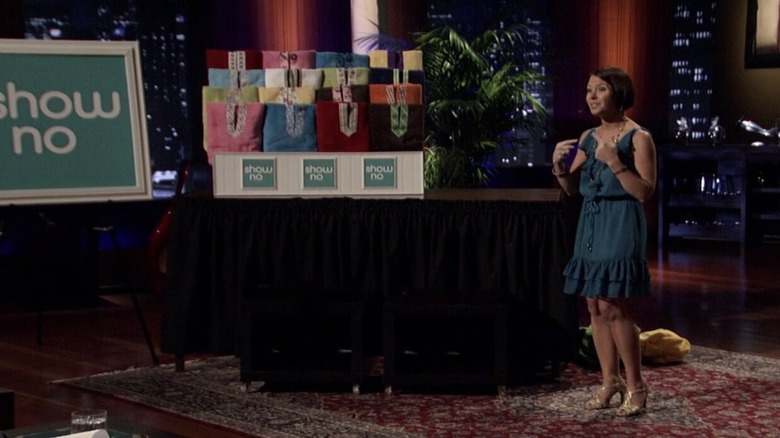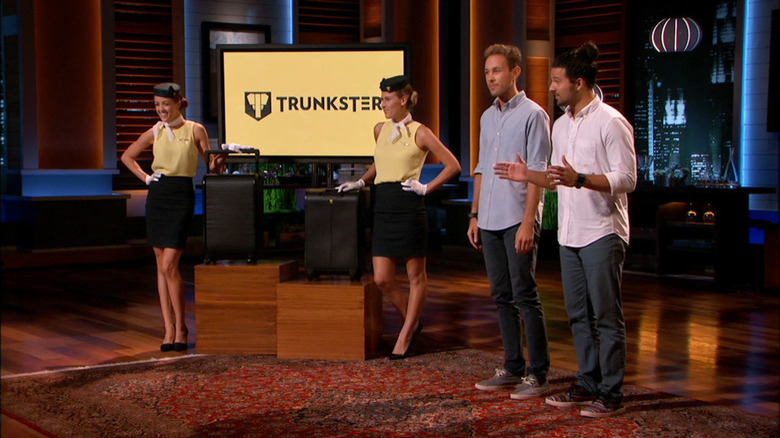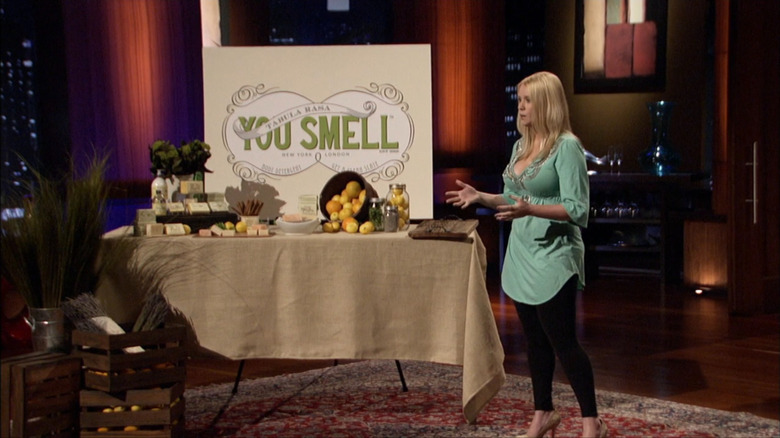10 Shark Tank Products That Failed Spectacularly
"Shark Tank" has helped launch numerous companies to great success. The panel of established entrepreneurs isn't always easy to impress, so when a deal gets made, there's good cause for celebration. Some of the highest-grossing companies featured on "Shark Tank" include Bombas Socks, which has sold over a billion dollars worth of products at this point, and Scrub Daddy, the smiley-face sponge now carried in ample retail stores.
Of course, not every budding business owner gets to make a deal. The sharks can be brutal as they dress down why a business seems doomed to fail from the start. Then, there are the more interesting instances where a deal gets made on television, but something goes wrong behind the scenes. Reality TV isn't always what it seems, and even though a business owner may be ecstatic at the end of their segment, plenty can go wrong when trying to finalize all of the paperwork later.
These are the "Shark Tank" products that epically failed. You may have always wondered what happened to these businesses after striking a deal and why you never saw them on a store shelf near you. When all of the television glitz is gone, here's what remains of these once-promising enterprises.
Sweet Ballz
Selling delicious cakes in the shape of balls is naturally an enticing proposition, and Sweet Ballz co-founders James McDonald and Cole Egger already had a good amount of success before appearing on "Shark Tank." The company's cake balls could be found in 7-Eleven stores, but they wanted a $250,000 investment to get their products into even more businesses. McDonald and Egger got a taste of sweet success when Mark Cuban and Barbara Corcoran ponied up the money, so what happened with Sweet Ballz?
Shortly after their episode of "Shark Tank" was filmed, McDonald sued Egger over breach of contract. The suit claimed that Egger tried to buy out McDonald as well as Matt Landis, who had also been with the company since the beginning. Additionally, the suit stated how Egger tampered with the website Sweetballz.com to redirect to a different website called Cakeballz.com, which sold similar products. Shortly thereafter, the former website disappeared entirely (although it's back up now).
McDonald even filed a restraining order against Egger at one point, and the partnership ended. However, Sweet Ballz gets listed among "Shark Tank" products that failed spectacularly not because it went bankrupt. The show is about more than getting an investment, although that's certainly nice. It's basically free advertising, and Sweet Ballz was unable to properly capitalize on its time in the spotlight due to legal issues.
The Breathometer
Mark Cuban would eventually call the Breathometer the worst "Shark Tank" investment he ever made, but at the time, the product seemed poised for success. CEO and founder Charles Michael Yim appeared on the show and promised how his product, a breathalyzer that could connect via an app to see the person's blood alcohol level, could save lives. Astonishingly, all five sharks went in together to invest, rounding up $1 million amongst all of them to get the company on the right foot.
In a bit of foreshadowing, a discussion of accuracy and the legality of the product came up in the "Shark Tank" episode, and wound up being the company's undoing. Breathometer, Inc. got in trouble with the Federal Trade Commission over deceptive marketing and falsifying claims. For example, the Breathometer claimed to have undergone government-lab-grade testing to ensure its accuracy when measuring blood alcohol content. In actuality, no such testing took place. The company was forced to issue refunds to anyone who bought the product.
Breathometer is no longer around, and the company briefly tried to pivot to offering a device that checked whether you had bad breath. But that isn't quite as an attractive investment as something that could (supposedly) save lives. Ultimately, the Breathometer episode of "Shark Tank" is a lesson in how even experienced entrepreneurs should still conduct due diligence before getting involved in anything.
ToyGaroo
From watching TV shows to getting clothing delivered, subscription models are more popular now than ever. In 2011, ToyGaroo was a promising start-up when it got on "Shark Tank." Nikki Pope explained the business model of having parents pay a subscription fee to have new toys shipped to them every month. The idea was that kids could play with them for a while, and when they got bored, the parents could ship them back and get a new toy at a lower price point than constantly buying new toys. Mark Cuban and Kevin O'Leary invested $250,000, but what happened next is an example of how having too many cooks in the kitchen can lead to a business' demise.
Phil Smy, a software developer for ToyGaroo, explained the company's downfall in an interview with Failory. Apparently, there was infighting between the core ToyGaroo team and the new representatives from Cuban and O'Leary. Smy also disagreed with their business ideas explaining, "We offered free shipping, and because toys were so variable in shape and size that was the wrong thing to do. My recollection is that we wanted to move away from the 'free shipping' model but Cuban's team was adamant." Shipping and sourcing proved more expensive than the company could keep up with, and it eventually went out of business, joining the ranks of famous "Shark Tank" companies that don't even exist anymore. When asked if there was anything he'd go back to do differently with ToyGaroo, Smy stated, "Not go on 'Shark Tank.'"
Body Jac
Cactus Jack Barringer was one of the earliest pitchers on "Shark Tank" back on Season 1, and he showcased an innovative workout machine that claimed to make doing push-ups far easier. Barbara Corcoran and Kevin Harrington threw down $180,000, and Corcoran added an extra stipulation that Barringer needed to lose 30 pounds himself to prove the product's efficacy. While he succeeded, that's about the only good thing to come out of the Body Jac.
Unlike other "Shark Tank" failures, there are no clear indicators of what went wrong with the Body Jac, but it's no longer available for purchase. While chatting with The Shark Tank Blog, Corcoran kept things vague when talking about Barringer: "If I invest once and lose my money, like with Frank [Scozzafava of Mix Bikini], or with Cactus Jack, lost my money on the Cactus Jack Body Jac. I love them both. They're both great entrepreneurs, but I didn't go back there again."
Corcoran lost her money, and the Body Jac isn't around anymore. But Barringer is still out there spreading his wisdom. In March 2024, he gave a lecture at Iowa State called "Out-Sharking the Sharks," where he provided lessons on entrepreneurship. If nothing else, the Body Jac remains one of the more mysterious "Shark Tank" failures.
Foot Fairy
Promoting a product on "Shark Tank" that promises to help people in some way is always going to get guests some brownie points. Foot Fairy from Season 5 falls into that category as the founders, Nicole Brooks and Sylvie Shapiro, sought funding for an app that could more accurately assess a child's correct foot size. The idea is that this would make it easier to find better-fitting shoes and avoid foot issues later in life. Mark Cuban offered $100,000 for 40% equity, but the deal was never finalized.
It may not come as a surprise that the money never materialized, as Cuban seems hesitant in the episode. He even mentions how the founders, who continually bring up their passion in lieu of hard figures, might drive him batty. A few months after Foot Fairy was featured on "Shark Tank," the company went out of business. Reviews suggest there were app issues on certain devices. Foot Fairy was designed to make money off commissions through a partnership with Zappos. However, a limited selection of shoes people could buy through the app may have prevented parents from buying anything directly through the company.
Foot Fairy's no longer around, and it marks yet another defunct business Cuban tried to invest in through "Shark Tank." These days, there are many foot-measuring apps available, like FootFact and FeetMeter, so it was clearly a worthwhile idea. It was just the wrong iteration.
CATEapp
CATEapp was labeled a cheater's app on "Shark Tank" due to its function of hiding text messages from select contacts. Obviously, that would appeal to individuals who want to keep certain activities on the down low, so it's no wonder why some sharks declined to make an offer for ethical reasons alone. However, it was also mentioned how CATEapp could aid undercover law enforcement and victims of domestic abuse who may also want to hide certain conversations. Ultimately, Neal Desai got an offer for $70,000 for 35% equity from Daymond John and Kevin O'Leary.
As happens frequently on "Shark Tank," the deal made on air didn't actually come to fruition. Still, the app had a promising sign when it received an extra 10,000 downloads after the episode aired. But that wasn't enough, and the app was taken down from app stores shortly after. It's unclear why the company couldn't keep things going, but it's possible that not getting that $70,000 was a death knell for the business (despite Desai valuing it at $1 million). Similar to Foot Fairy, CATEapp likely would've wound up just one of many apps within its niche. From VPNs to locking certain apps, privacy is a big game now that everyone's lives are stored on their phones.
ShowNo Towels
At first glance, ShowNo Towels seemed primed to be another great "Shark Tank" success story. Shelly Ehler appeared on the series to promote her line of towels shaped like ponchos for children. Lori Greiner not only invested $75,000 into the company, but she even handed Ehler a check on the spot. Things quickly took a turn after that.
Ehler claimed that the following day, Greiner informed her not to cash that check and apparently even tried to change the terms of the deal. ShowNo Towels were, at one point, sold at Disney waterparks, but that represents the zenith of the organization. The Disney partnership wasn't permanent though, and the company eventually went under.
On Ehler's personal blog, she wrote of the experience, "I once cursed my 'Shark Partner' for kicking me to the curb. But now I thank her. She taught me so much more than she thought she did and none of it was about business. All lessons are blessings. When we embrace them, we receive the gift!" Ehler changed careers entirely and now works as a hypnotherapist.
Trunkster
Many modern inventions claim to "disrupt" a given industry, and that's precisely what Jesse Potash and Gaston Blanchet promised to do with Trunkster on Season 7 of "Shark Tank." They presented new-and-improved luggage options that came with digital scales, USB ports, and GPS trackers. With a $28 million valuation, Trunkster caught the eye of both Mark Cuban and Lori Greiner, who put forth $1.4 million in exchange for 15% of the company. It's a massive deal, so how come Trunkster isn't around anymore?
It's probably for the best Cuban and Greiner never closed that deal, as it appears that valuation may have been an extension of Trunkster raising over $1 million from both Kickstarter and Indiegogo. Looking through the comments on Kickstarter, it appears the company couldn't keep up with demand even from the beginning, with many people angrily asserting that they never received their luggage and want refunds. It's unclear whether refunds were ever issued, but Trunkster ultimately went under.
One of Trunkster's co-founders moved onto greener pastures. Blanchet is a co-founder for Storypod, another business venture that sought funding through Kickstarter. However, looking at the Kickstarter comments for that venture, people seem far more pleased with their investment.
You Smell Soap
Even though You Smell Soap made a deal on "Shark Tank," it still failed in the end due to a lack of communication for months afterward. Founder Megan Cummins presented her luxury soaps to the sharks. This ended with Robert Herjavec offering a handshake agreement to get 20% equity of the company for $55,000 in addition to giving her a $50,000 salary. It was a great deal for the blossoming company, but after taping the episode, Cummins didn't hear from Herjavec for months.
Herjavec explained to CNET, "After the show we begin the due diligence process. As is the case with Megan in the process you find out different things and adjust." His adjustment involved now wanting 50% equity, which Cummins turned down. Cummins wound up selling the company entirely to another investor, but it eventually went out of business.
Cummins shared one thing she'd do differently on "Shark Tank" with Billion Success saying, "Gone with Mark Cuban. Robert was shaking my hand as Mark was meeting his offer, it all happened so fast I had no time to think." These days, Cummins oversees the Etsy shop Downloads That Donate, which offers cute designs folks can pay for and download to put on t-shirts.


